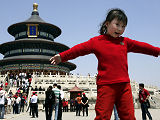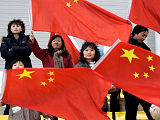5 Minute Guide: China
Updated on 19 June 2007
It's the most populous nation on earth, and its economic growth is in double digits. The 21st century may well belong to China.
Why is China important?
China wields an influence on the lives of people far from its shores. Environmentally, economically and politically, decisions made by China have a knock-on effect throughout the world.
Its government may still be Communist but it has dismantled collectivisation and installed a free market economy which continues to accelerate - for the last three years growth has been roughly 10 per cent.
China has now overtaken the UK as the globe's fourth biggest economy. This in turn has caused insatiable demand for raw materials such as copper, steel and oil, while cheap Chinese goods have helped to keep inflation under control in Europe and the USA.
China is building a coal-fired power station on average every week to 10 days.
The fast-growing economy has also fuelled its need for energy; the country is the biggest consumer of oil after the US and the biggest consumer of coal in the world.
Its desire for energy resources has informed its policy decisions in Africa, such as turning a blind eye to human rights abuses in Sudan because of its oil interests there. It also has energy interests in Angola and Nigeria.
Meanwhile it is building a coal-fired power station on average every week to 10 days, and is massively expanding aviation, which in turn has huge environmental ramifications.
Any solution to global warming would require the cooperation of China, and in June 2007, the government released its first strategic plan on climate change.
However, the policy remained the same: economic growth is still China's priority, and while the plan said the government takes climate change seriously, it also said that continuing poverty in developing countries could have a more devastating effect."
What does it mean?

China is a nuclear power and a permanent, veto-wielding member of the UN Security Council, championing "non-interference" and "national sovereignty" at a time when the US favours intervention to stop nuclear proliferation and spread its idea of democracy.
China's strategic importance is clear; it seems to be the only country that has any influence over the rogue state of North Korea and it has urged a diplomatic solution to the burgeoning Iranian nuclear programme.
However, China still claims Taiwan as a province and has threatened to invade should Taiwan declare independence. China also maintains its rule over Tibet, which it annexed in 1951, and to which human rights organisations claim it has no right. A long-standing border dispute with India has been shelved if not formally solved.
Relations with the US are key. The two nations are yoked by a massive trade flow that neither would want to jeopardise.
But the trade is imbalanced; the Americans buy much more from the Chinese than the Chinese buy from them, and many US politicians blame China for artificially undervaluing its currency to keep its goods cheap in a US dollar market.
What happens next?

Human rights campaigners say key problems China has to address include censorship and the lack of an independent judiciary. Also, a wealthier, more educated urban elite may one day demand the freedoms of democracy denied them.
In addition, the wealth gap between urban and rural China is one of the biggest in the world. Many rural dwellers are rushing to the cities for employment but there is criticism internationally that hundreds of millions have not benefited from China's runaway economic success.
Key players
Hu Jintao
Top of the heap is Hu Jintao, General Secretary of the Communist Party and state president.
A party stalwart with little charisma, his slogans are "harmonious society" and "new socialist countryside", code words meaning that he fears that China has become too unequal and that the peasants are not benefiting from economic success.
But he fears independent criticism. Under his rule, many human rights lawyers and cyber-dissidents have been arrested, while newspapers and websites are closed down.
He's expected to be in post until 2012 at least, guaranteeing him a central role in this crucial period in China's history.
Wen Jiabao
The nation's premier and something of a sidekick to Hu Jintao, Wen is known for his "man of the people" style. He's been wearing the same green anorak for 12 years.
He is frequently seen on TV talking to peasants and workers, trying to convince them that he and Hu will champion their interests above those of provincial and local officials and wealthy business people.





